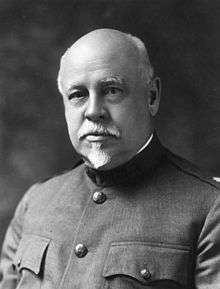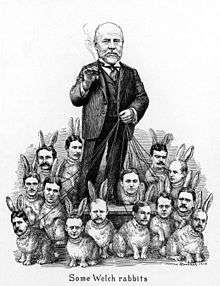William H. Welch
| William H. Welch | |
|---|---|
 Welch as brigadier general circa 1917-1921 | |
| Born |
April 8, 1850 Norfolk, Connecticut |
| Died |
April 30, 1934 (aged 84) Johns Hopkins Hospital Baltimore, Maryland |
| Residence | Baltimore, Maryland |
| Nationality | United States |
| Education | Yale University; College of Physicians & Surgeons of Columbia University |
| Occupation | Physician; Pathologist |
| Known for | First Dean of Johns Hopkins School of Medicine and School of Public Health |
William Henry Welch (April 8, 1850 – April 30, 1934) was an American physician, pathologist, bacteriologist, and medical school administrator. He was one of the "Big Four" founding professors at the Johns Hopkins Hospital.[1] He was the first dean of the Johns Hopkins School of Medicine and was also the founder of the Johns Hopkins School of Hygiene and Public Health, the first school of public health in the country. Welch was more known for his cogent summations of current scientific work, than his own scientific research. The Johns Hopkins medical school library is also named after Welch. In his lifetime he was called "the Dean of American Medicine" and received various awards and honors throughout his lifetime, and posthumously.[2]
Biography
Early life
He was born on April 8, 1850 to William Wickham Welch and Emeline Collin Welch in Norfolk, Connecticut. Welch was educated at Norfolk Academy and the Winchester Institute, a boarding school. His father as well as a grandfather and four of his uncles were all physicians. William Henry entered Yale University in 1866, where he studied Greek and classics. Initially, Welch was not interested in becoming a physician; his primary ambition was to teach the Greek language.[3] He received an A.B. degree in 1870. As an undergraduate, he joined the Skull and Bones fraternity.[4]
Early career
After a short period of teaching high school students in Norwich, New York, Welch went to study medicine at the Columbia University College of Physicians and Surgeons, in Manhattan. In 1875, he received his MD. From 1876 to 1877, he studied at several German laboratories to work with, among others, Julius Cohnheim. This experience abroad prompted Welch to model his plans for a new medical institute on the Institute of the History of Medicine at the University of Leipzig.[3] He returned to America in 1877 and opened a lab at Bellevue Medical College (now a part of New York University Medical School).
Later career at Johns Hopkins
In 1884, he was the first physician recruited to be a professor at the newly-forming Johns Hopkins Hospital and Medical School at Johns Hopkins University in Baltimore.[1] By 1886 he had sixteen graduate physicians working in his laboratory – the first postgraduate training program for physicians in the country.[1] He helped the trustees recruit the other founding physicians for the hospital – William Stewart Halsted, William Osler, and Howard Kelly. Welch became head of the Department of Pathology when the hospital opened in 1889. In 1893, he also became the first dean of the Johns Hopkins University School of Medicine, and in 1916, he established and led the Johns Hopkins School of Hygiene and Public Health, the first school of public health in the country. During this time, Welch was also involved in creating a new medical library for Johns Hopkins. He embarked on a sabbatical in Europe, where he visited the University of Leipzig's Institute and various other universities, as well as libraries and bookstores. These German institutions influenced Welch's design for the Institute of the History of Medicine at Johns Hopkins, which was established in October 1929.[5] The new institute also built on the already existing Johns Hopkins Hospital Historical Club (est. 1890), of which Welch had been a co-founder.[6] Welch is also the founding editor-in-chief of the American Journal of Epidemiology.

Graduates of Welch's training programs were highly coveted as academic physicians. Medical schools and institutes across the country vied for Welch's former students and graduate scientists to fill top posts.[1] Many of his residents went on to become highly prominent physicians, including Walter Reed, co-discoverer of the cause of yellow fever, Simon Flexner, founding director of the Rockefeller Institute for Medical Research, and future Nobel laureates George Whipple and Peyton Rous.
Welch's research was principally in bacteriology, and he is the discoverer of the organism that causes gas gangrene. It was named Clostridium welchii in recognition of that fact, but now the organism usually is designated as Clostridium perfringens.
From 1901 to 1933 he was founding president of the Board of Scientific Directors at the Rockefeller Institute for Medical Research. He was an instrumental reformer of medical education in the United States as well as a president of the National Academy of Sciences from 1913–1917. He also was president of the American Medical Association, the Association of American Physicians, the History of Science Society, the Congress of American Physicians & Surgeons, the Society of American Bacteriologists, and the Maryland State Board of Health. Welch was a founding editor of the Journal of Experimental Medicine.
Welch served in the U.S. Army Medical Corps during World War I, and remained in the Reserve Corps for three years thereafter, attaining the rank of Brigadier General (07). For his service during the War, Welch received the Distinguished Service Medal.
Death
Welch died on April 30, 1934, at the age of 84, of prostatic adenocarcinoma at Johns Hopkins Hospital.[2]
Honors/Awards
- Welch was awarded Royal Order of the Crown of Prussia in 1911.[3]
- In 1927, Welch received the Kober Medal from the American Association of Physicians.[3]
- The William H. Welch Medical Library at Johns Hopkins, which opened in 1929, was decided on March 5, 1928 to be named after him.[7]
- In 1931, Welch received the Harben Medal from the Royal Institute of Public Health for his professorship in the History of Medicine.[3]
- Welch Road, in the vicinity of Stanford University Medical Center in Stanford, California is named in his honor.[8]
See also
References
- 1 2 3 4 Johns Hopkins Medicine:The Four Founding Professors. Hopkinsmedicine.org. Retrieved on 2012-03-12.
- 1 2 "Dr. William H. Welch". New York Times. May 2, 1934. Retrieved 20yti07.
The Dean of American Medicine is dead, but will live long in the chronicles of science and philanthropy. In his time the average expectation of life in America was increased by at least twenty years, and he had a major part in that achievement. His eightieth birthday was celebrated gratefully from Baltimore to China.
Check date values in:|access-date=(help) - 1 2 3 4 5 "Chronology of the Life of William Henry Welch". Chesney Medical Archives of the JHMI. Retrieved March 31, 2015.
- ↑ William Henry Welch and the Heroic Age of American Medicine by Simon Flexner and James Thomas Flexner Johns Hopkins University Press (1993). ISBN 0801845017
- ↑ Institute of the History of Medicine history. Welch.jhu.edu. Retrieved on 2012-03-12.
- ↑ Flexner, Abraham H. (1946), Daniel Coit Gilman: Creator of the American Type of University, New York: Harcourt, Brace and Company, p. 141. – via Questia (subscription required)
- ↑ Welch Library:history. Welch.jhu.edu (2008-07-15). Retrieved on 2012-03-12.
- ↑ "William H. Welch, M.D. ("the Dean of American Medicine") ‹ Back to Welch surname". GENi. GENi. February 20, 2015. Retrieved March 31, 2015.
Further reading
| Wikimedia Commons has media related to William H. Welch. |
- Chronology of the Life of William Henry Welch
- Bench and Bedside, December 2007, "Honoring the Past"
- Barry, John M. (2004). The Great Influenza: The Epic Story of the Greatest Plague in History. Viking Penguin. ISBN 0-670-89473-7. (This book covers a great deal of Welch's life as well as other medical people of the era.)
- Donald Fleming (1954). William H. Welch and the Rise of Modern Medicine. The Johns Hopkins University Press. ISBN 0-8018-3389-2.
- Silverman, BD (2011). "William Henry Welch (1850–1934): the road to Johns Hopkins". Baylor University Medical Center Proceedings. 24 (3): 236–42. PMC 3124910
 . PMID 21738298.
. PMID 21738298.